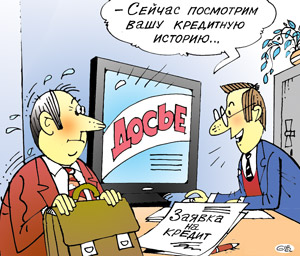Belarusians are beginning to appreciate their positive credit stories
A Study of Federal Reserve Bank conducted recently in the USA found that the reluctance of banks to lend to people with flawed credit history impedes the country’s economic recovery as it constrains consumer lending and spending. This sounds quite reasonable, all the more so because Belarus’ last year’s experience proves this viewpoint. Banks cut consumer lending which affected households’ willingness to purchase cars, housing and home appliances. As a result, domestic demand is stagnating. As for credit histories, most Belarusians rarely think about them. However, they are relatively disciplined payers compared to borrowers from the neighboring countries. Banking sector professionals argue that this catalyze faster recovery of the lending market.
As bankers tell, the Belarusian credit bureau, or as it is officially called, Credit Register, is a real reason for the envy of most of their colleagues from the CIS. “This is a civilized way of collecting information that promotes the development of banking business and guards borrowers’ interests”, says Oleg Borodko, deputy governor of BPS-Sberbank. “Most neighboring countries envy us.” The expert maintains that Belarusians start to appreciate having positive credit histories, although for them it is a matter of a good reputation rather than an additional benefit. “Why are positive credit histories so highly esteemed in western countries? People build it for years in order to get a discount for a loan,” the banker explains.
A credit history is a kind of a borrower’s dossier containing all information from banks. It has data on how much and on what terms a person borrowed, if he or she repaid the loans, failed to make timely payments and if he or she has any outstanding debts at the moment. It is clear that if a credit history is good, the doors of a credit institution are opened for a borrower despite the crisis. Conversely, if a borrower is in arrears or refused to repay debts for no apparent reason, he or she should not be surprised if a loan application is rejected.
Since 2009 Belarusian bankers are obliged to submit all the information about borrowers irrespective of the loan amount to the state. Any legal entities or individuals can use this information if they have a written consent for that. Granting consent is voluntary. However, a refusal to reveal this information might result in a loan rejection.
Of course, every bank has its own blacklist. There is a kind of register of persons to whom the credit can not be issued under any circumstances. But credit bureaus are a far more effective mechanism to monitor the quality of borrowers. The fact that Belarus has got a credit register is a breakthrough, all the more so because it is a state register created using experience of similar agencies operating in Western Europe, especially France.
In the beginning of July the credit register of the National Bank of Belarus contained more than 3.9 million credit histories.
According to the law ‘On Credit Histories’, every Belarusian has the right to request a credit report (once a year for free and an unlimited number of times for a fee). The credit report is to be submitted within six working days.
A number of studies confirm effectiveness of credit bureaus. Fair Isaac conducted two researches in the United States based on more than 1 million individual certificates made by one of the US credit bureaus upon requests from credit institutions. The certificates were divided into positive and negative. If an individual delayed a loan payment for at least three months within a period of one year, a certificate would be classified as negative. Accordingly, each individual’s position was estimated as good or bad as of the survey date. The research revealed that if lenders extended loans to all individuals regardless the quality of their dossiers, 12.8 % of all loans would have been questionable, i.e. they not would be repaid on time or would not be repaid at all.











